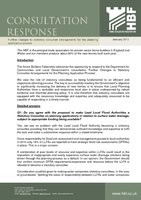The HBF is the principal trade association for private sector home builders in England and Wales and our members produce about 80% of the new homes built each year.
Introduction
The Home Builders Federation welcomes the opportunity to respond to the Department for Communities and Local Government’s consultation ‘Further Changes to Statutory Consultee Arrangements for the Planning Application Process’.
We view the role of statutory consultees as being fundamental to an efficient and responsive planning process. The key to successfully meeting the Government’s objective to significantly increasing the delivery of new homes is to ensure that Local Planning Authorities have a workable and responsive local plan in place underpinned by robust evidence and informed planning policy. It is vital therefore that statutory consultees are equipped with the necessary knowledge and expertise and adequately resourced to be capable of responding in a timely manner.
Detailed answers
Q1: Do you agree with the proposal to make Lead Local Flood Authorities a Statutory Consultee on planning applications in relation to surface water drainage, subject to appropriate funding being available?
Yes, we see no problem with the Lead Local Flood Authority becoming a statutory consultee providing that they can demonstrate sufficient knowledge and expertise to fulfil the task and make a substantive response within a stated timeframe.
Since responsibility for flood risk assessment and management passed to local authorities in 2010 only 18% of LLFAs are reported to have strategic flood risk assessments (SFRAs) in place. This is a major concern.
A combination of poor levels of resource and expertise within LLFAs could result in the imposition of inappropriate and overly expensive surface water drainage solutions being driven through the planning process as a default. In our opinion, the Government should first confirm minimum SFRA requirements/experience and resource before the LLFA is allowed to become a statutory consultee.
Consideration could be given to making water companies statutory consultees, in the area of groundwater. Splitting the areas of responsibility between LLFAs and water companies would increase the number of statutory consultees overall but could improve the overall level expertise applied to the specific areas of consideration.
Q2: If Lead Local Flood Risk Authorities were to be made a Statutory Consultee on development in relation to surface water drainage, do you agree that this should be limited to major development?
We agree that the new approach should be limited to major developments. However, it should be recognised that the cumulative effect of small developments within a surface water drainage catchment can be an important consideration. This should be used to inform the LLFAs’ strategic flood risk assessments and provide a basis for medium to long-term strategic planning rather than increasing requirements for every development.
Q3: Do you think that there is a case for Lead Local Flood Risk Authorities to be a Statutory Consultee on the following issues? If so, do you think this consultation requirement should apply to development of a certain size, and/or in certain risk locations?
(a) Development with groundwater implications?
(b) Development in proximity to ordinary watercourses?
(c) Any other local flood risk issues?
In order for LLFAs to be effectively equipped to fulfil such responsibilities they should have sufficient knowledge of the issues concerned. It is not clear that LLFAs will have the necessary knowledge and experience to consider groundwater quality/management. Water companies may be better equipped in this area.
As for the remaining areas we do not have any concerns.
Q4: Do you agree with the proposed changes as set out in Table 1?
The changes seem to be appropriate and beneficial in terms of reducing the risk of over-consultation whilst ensuring that the Environment Agency retains a role in assessing areas of potential risk.
Q5: Do you have views on whether water companies should be made statutory consultees in respect of shale oil and gas development?
In our opinion it is imperative for WaSCs to become statutory consultees not just for shale oil and gas exploration and recovery but also the investigation and recovery of coal bed methane. As noted above there may also be a role for WaSCs in providing input on wider issues relating to water quality and surface water management systems.
